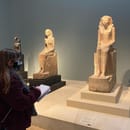For as long as I can remember, I’ve been fascinated by Ancient Egypt. I’ve carried this with me through my college years, right up to working on my honors thesis about Egyptian artifacts right here at Rutgers University. While this field of study has its share of ups and downs, through it all there is one woman who inspires me to keep going and follow my passion: Dr. Kara Cooney, Egyptologist at UCLA. Last March, I had the pleasure of meeting Dr. Cooney for a Her Campus interview over Zoom. During the interview, we talked about a range of topics in academia, Egypt, and modern politics. I learned a lot about issues within the world of academia and universities.
As an educator, Dr. Cooney has in recent years become more active in teaching ancient Egyptian history to the public. Over quarantine, Dr. Cooney made YouTube videos explaining different topics in both ancient Egypt and in the modern political climate.
During the interview, Dr. Cooney taught me a mini-lesson in how Cleopatra used her femininity for power. Cleopatra used her sexuality to create lineage and was able to end up with, as Dr. Cooney put it during the interview, “two Roman warlord boyfriends.” She gave birth to their children who she used as leaders to create competition with Rome. Although Western literature portrays Cleopatra as a seductress, Dr. Cooney pointed out how she was portrayed differently in medieval African and Middle Eastern literature. In medieval Arabic literature, Cleopatra’s story is more centralized around her scholarly achievements and leadership rather than her love life. It is the Roman patriarchy that chose Cleopatra’s narrative to center around her relations with Antony and Caesar.
There is a significant quote from When Women Ruled the World that has stuck with me with regards to Cleopatra that states, “Cleopatra is the only woman in these pages to have expanded her dynasty using her own procreative abilities, placing herself at the center of the wheel of power as the producer of future kings.” (When Women Ruled the World). Dr. Cooney describes Cleopatra’s sexuality as her power over men.
Dr. Cooney and I also discussed the impact of the pandemic on college education. One of the most shocking moments for me was Dr.Cooney’s example of poor practice in online learning.
“There was one story I heard about a class which was being taught by a dead professor,” she said. Yes, a dead professor. Dr. Cooney explained how universities were using old videos and lecture content to teach classes to students. In some cases, the professor who initially created the content was dead.
These kinds of situations are extremely dangerous, as Dr. Cooney explained they will only further hurt the field of higher education if the content from dead professors can be used forever. Now that online classes have become more of a norm due to the pandemic, colleges can use older material for online courses while continuously charging students insufferable rates. Dr.Cooney stated, “[this use of technology] is a genie we cannot put back into the bottle.”
One of my favorite parallels Dr. Cooney makes between the ancient and modern world is the comparison of the ancient Egyptian funeral to the modern wedding. She explained how in ancient Egypt people showed off their wealth and social status at funerals. People do the same in wedding ceremonies today, as there is a huge distinction between a celebrity wedding and a middle-class wedding. Since hearing this comparison, I have never looked at weddings the same way!
Recently, Dr. Cooney has begun a podcast called Afterlives that covers a variety of topics about ancient Egypt and the modern world. Her episodes, “Demystifying Academic,” are especially relevant and helpful in regards to current issues in education. Her podcast releases new episodes every Monday and is very educational and entertaining. I hope to hear an episode on Hatshepsut or Ancient Egyptian fashion! I recommend listening to it, even if you do not know anything about ancient Egypt!
Dr. Cooney was extremely kind and helpful during our interview. She even took some time when I was done asking questions to give me some advice on applying to graduate school and recommended some programs to me. I love her work on Hatshepsut and find her to be a great innovator in academia and archaeology. I am beyond excited to read her new book, The Good Kings, which comes out on Nov. 2, 2021. It explores five Egyptian Pharaohs who ruled with absolute power. Dr. Cooney has a special talent for creating content that is both informative and entertaining to read. She has also written When Women Ruled the World, which tells the story of six major Egyptian Queens, and my personal favorite, The Woman Who Would Be King, which tells the story of Hatshepsut of the 18th Dynasty. Her work on Women in Power, specifically the book When Women Ruled the World, has kept me motivated and excited to continue studying ancient Egypt. In her work, she takes ancient Egyptian concepts and gives them a modern spin, making them interesting to follow.
I am honored to have gotten to talk to Dr. Cooney. Not many people get to say they got to meet and interview their hero, or as I would put it more appropriately, “Queen”. I recommend any young woman to reach out to their “Queen”! It was without a doubt a worthwhile experience. I hope Dr. Cooney loves how the article turned out! Her new book, The Good Kings, actually releases on my birthday- which I consider to be the best birthday gift I could get!


